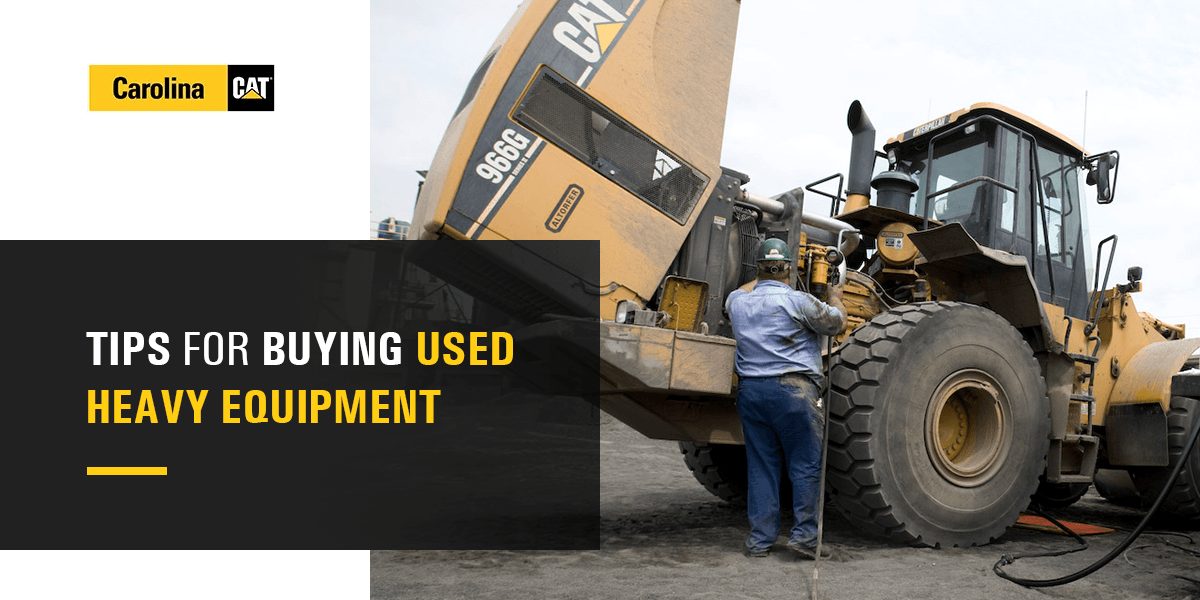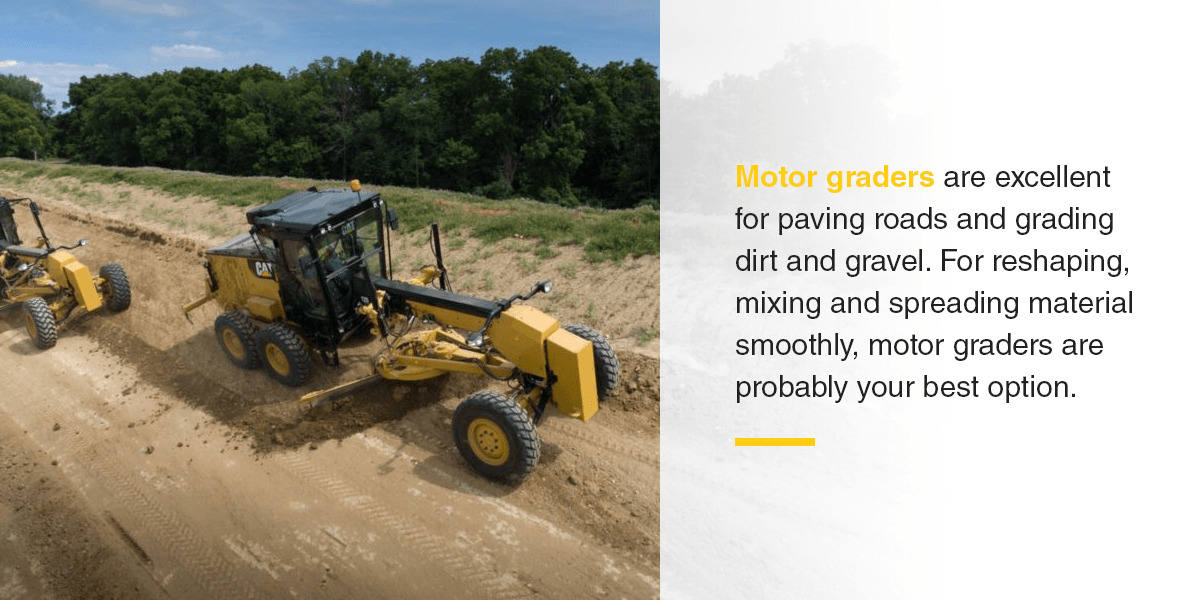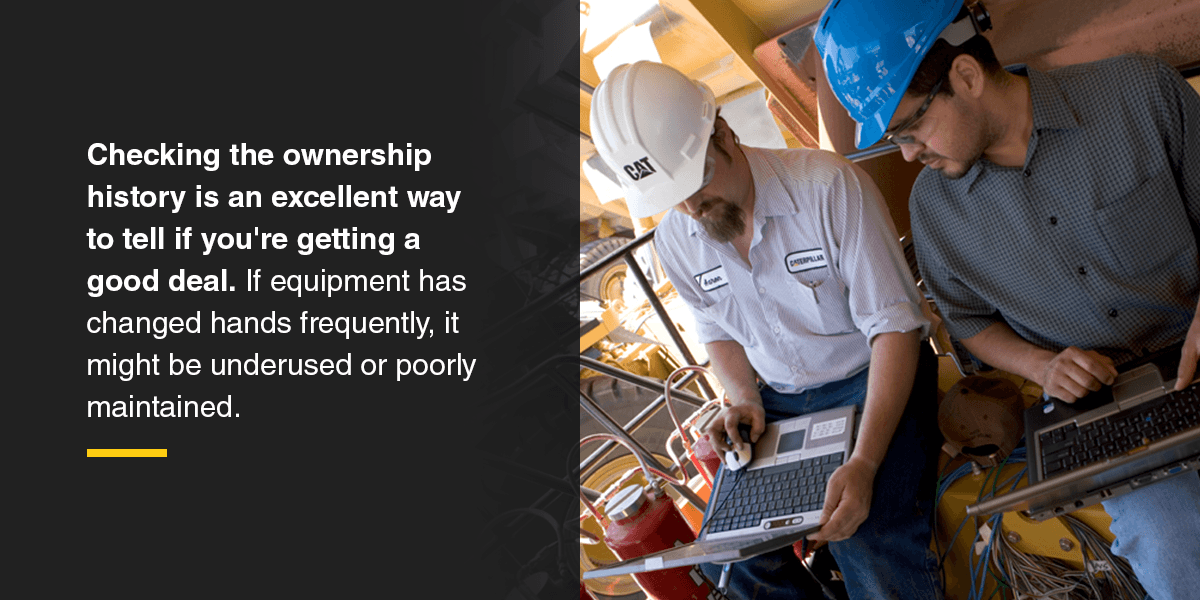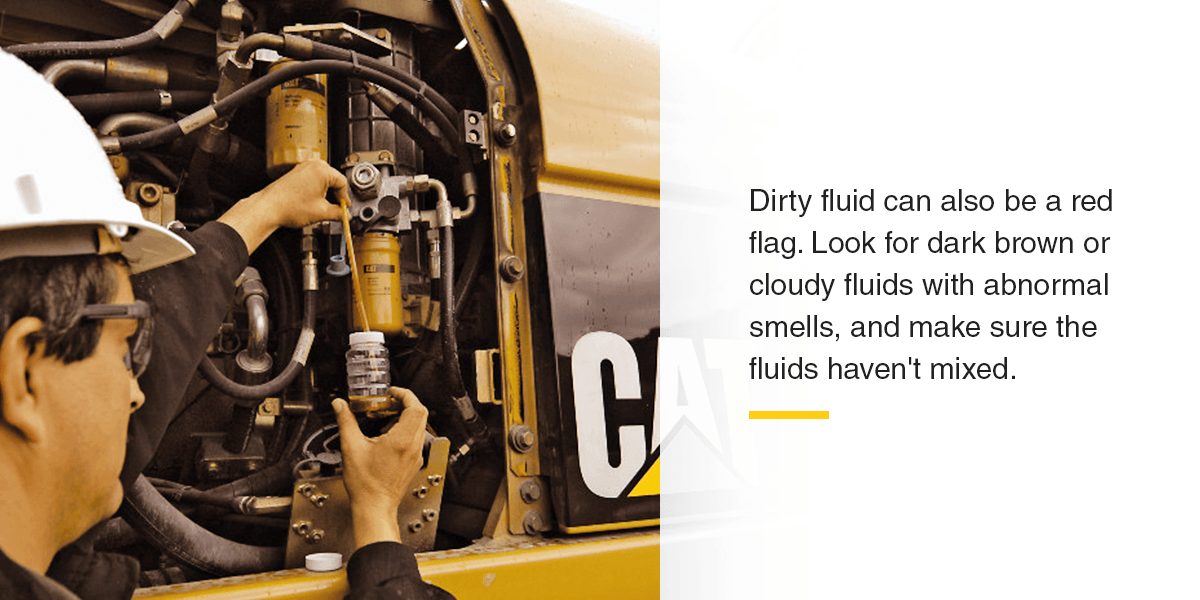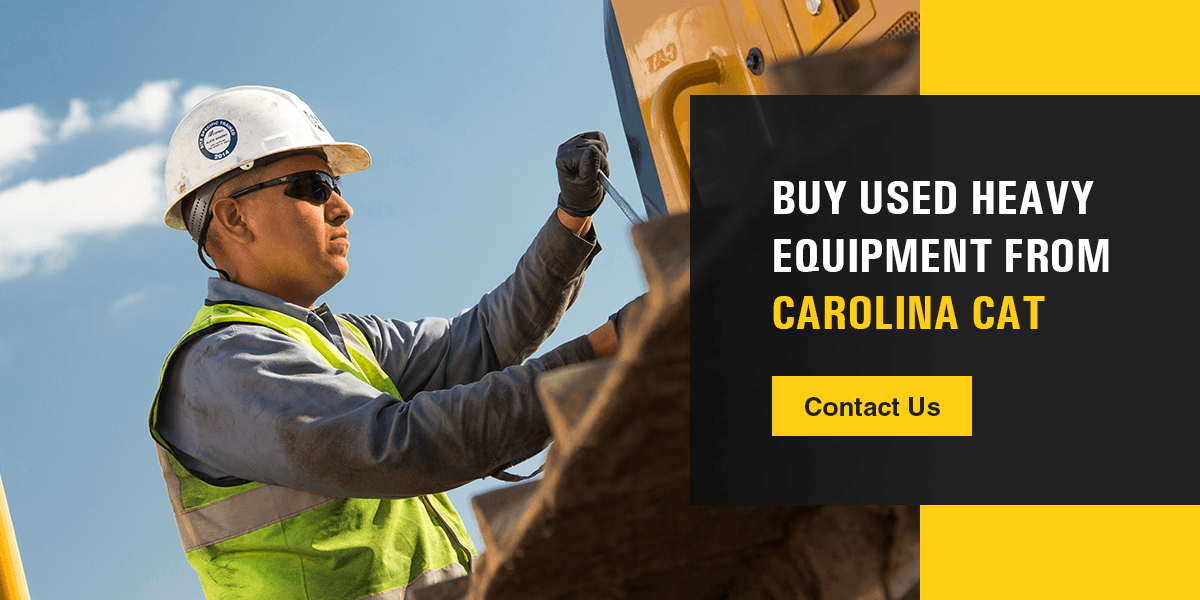For many in the industry, the question of new vs. used construction equipment comes down to one factor — cost. Used equipment is often more cost-effective than new equipment, making it more appealing to buyers. But it’s important to remember that the value you’ll get from a used machine depends entirely on how much use you can get out of it after purchase.
Large or heavy construction equipment can be used for many different kinds of jobs. These machines are especially convenient for improving labor productivity and performing tasks that would not be possible for the average worker alone. If you are in need of used heavy equipment for a construction project, it may seem strenuous to research and narrow down the best option for your demands. Here are some tips for buying used heavy construction equipment.
Knowing what to look for is key to finding a good used machine at a great price. So to help you out, we’ve created this list of pointers so you can learn how to buy used construction equipment.
Jump to Sections:
- Determine the Equipment You Need
- Consider Your Logistics
- Research the Seller
- Examine the Machine’s History
- Inspect Used Equipment Before Purchase
- Find a Partner You Trust
Determining What Equipment You Need
Heavy equipment purchasing is easier if you know what type of used machines you need. Depending on the size of your project that your business or organization requires, you may need several models of construction equipment. There are hundreds of industries and jobs that require different heavy equipment types, such as:
- Industrial manufacturing
- Transportation
- Commercial wholesalers
- Repairs
- Automotive maintenance
- Construction
- Farming and forestry
- Housing and real estate
- Commuter rail systems
Before starting any projects, landscaping, demolition, remodeling or other areas of construction, you need to find the right variation of used equipment for your industry needs.
Within these industries, heavy equipment comes in various types and has many different uses for projects. Some examples of used equipment include:
Articulated Trucks
This type of equipment is routinely used for hauling products and materials around and is built to easily roam over different types of terrain in all sorts of weather conditions. An articulated truck consists of a cab and a trailer. They are generally referred to as improved versions of dump trucks due to their updated mechanisms that make them easier to operate. This equipment is often used for construction, mining, waste handling, transporting loose material and quarrying.
Backhoe Loaders
Frequently known as a backhoe, this make of heavy equipment comes equipped with an adjustable shovel, which is often used for digging and transferring heavy or oversized loads. A used backhoe loader, which comes in numerous sizes, is also great for landscaping, trenching, breaking pavement and excavating.
Excavators
Used excavators are another popular type of industrial construction equipment. This machine operates with a long arm attached to a bucket for digging, which is operated manually. Excavators are able to rotate in any direction for full capability and easy use. These machines are most commonly used for demolition, cutting down trees, mining, snow removal, rail construction and many other excavation uses.
Dozers
Also known as crawler tractors and bulldozers, this type of equipment is perfect for removing or transferring soil, sand and other materials. This machine has a sharp metal plate, known as a ripper, that helps to break through compacted solid substances. Dozers are available in an assortment of sizes and are customarily used in industries such as farming, construction, engineering and mining.
Forest Products
In forest-related jobs, such as logging, various make of equipment are utilized to help navigate difficult terrain, limit soil disturbance and improve safety conditions. Some models include:
- Swing machines
- Crawler chassis
- Skid steers
- Log loaders
- Tricycles
Used forest products allow the operator to cover more ground and improve the ability to efficiently harvest, remove tree stumps or plant trees.
Motor Graders
Motor graders are excellent for paving roads and grading dirt and gravel. For reshaping, mixing and spreading material smoothly, motor graders are probably your best option. This machine is also a great choice when dealing with certain weather conditions because snowplow blades can typically be attached to the front of the system.
The Carolina Cat Used Hotlist
Don't miss this month's hottest deals on used Cat construction equipment on our Used Hotlist. Check out this month's inventory while supplies last!
Considering Your Logistics
When purchasing used heavy construction equipment, it’s important to consider factors that might alter your requirements. When deciding whether to buy new or used machines, think about these benefits and tips for heavy equipment purchasing:
- Cost: The expense of your equipment can vary depending on if it is new, used or rented. Used equipment is provided at a lower cost and allows you to receive an improved value for your money.
- Seasonality: The environment and weather can often change your need for a specific machine. Storm cleaning trucks, for example, are perfect for geographic landscapes that are susceptible to hurricanes and flooding.
- Availability: You can often find a variety of used equipment models that are readily available to purchase.
- Timeline: Depending on when you plan to start a project, having your machines and attachments accessible exactly when you need them ensures your construction schedule won’t be interrupted or delayed.
While these are helpful tips for buying used heavy construction equipment, it’s always wise to know all of your available options. While buying used machinery may seem like the best choice, you may not need your equipment for a big project or for a long time. In this case, you should look into renting your equipment to get what suits your needs.
Rental equipment is a worthwhile alternative if you have limited storage available. Or, suppose you happen to run into an emergency project and need equipment as soon as possible while staying within your company’s budget. In that case, you should contact a construction rental equipment company that has a wide selection of available machines.
If you are still unsure of what alternative is best for you, request a quote online for additional information.
Research the Seller
Before heading to the lot, try to learn as much about the seller as possible. A well-established seller should have reviews or testimonials available online.
For smaller or newer dealers, do as much research as possible to learn more about them. It might help to ask colleagues and business partners if they’ve had experience with this seller, or track down information from past customers. Their experience in the industry is another sign of credibility – someone who’s been selling heavy equipment for a long time, or is part of a family business, will be a safer bet than someone who’s new to the scene.
Pro tip: Any trustworthy seller will let you test the equipment before you make a decision. If the seller bars you from taking a test drive, they may be hiding something from you.
Examine the Machine’s History
Checking the ownership history is an excellent way to tell if you’re getting a good deal. If equipment has changed hands frequently, it might be underused or poorly maintained. But if it’s been with one owner throughout its operating life, it’s likely the owner took good care of it.
Additionally, you should look out for ownership issues, such as liens and seizure of equipment. Liens are problematic because they can interfere with your legal rights as the machine’s owner. Seized equipment is also concerning – it means the equipment was taken from a buyer who could not pay in full, so maintenance was probably spotty at best.
Maintenance Record
The machine’s maintenance record should tell you everything you need to know about its condition. A detailed record of proper maintenance reduces the chance that you’ll encounter surprises during use.
The previous owner should have recorded the following:
- Fluid changes
- Any repairs, major or minor
- Issues experienced during normal operation
- Any current replacement needs
Pay extra attention to the frequency of past repairs. If one part is consistently experiencing serious issues, chances are high you’ll have the same problem moving forward.
Inspect Used Equipment Before Purchase
Before you buy, it’s best to conduct a thorough inspection of the machine to ensure you’re getting the best deal. If you don’t feel confident in your ability to thoroughly inspect heavy equipment, bring a trusted colleague or local expert along to help you.
Look out for the following when inspecting a used machine:
Engine
Your machine’s engine is one of the most expensive parts to fix, so you want to make sure it’s in good condition.
Turn the engine on and let it run for a few minutes. Listen for abnormal noises like rattling, knocking, coughs or hiccups. Strange engine sounds can indicate engine malfunctions, which can cause serious issues later.
The exhaust color can also reveal potential engine issues:
- Bluish-gray smoke: The engine is burning abnormal amounts of oil. It could be the result of a worn seal or ring or indicate something as serious as a leak.
- White smoke: Watch for a few minutes to make sure the white smoke isn’t water or steam, which are both normal in cold starts. White smoke can mean that the engine is burning fuel incorrectly, which could stem from a faulty head gasket, water mixing with fuel, a compression issue or even coolant in the engine.
- Black smoke: The combustion engine has too much fuel in it. If it persists past startup, there may be a malfunctioning fuel component.
Fluid Levels
The condition of a machine’s fluids can reveal the care it has received. Check the levels of the following:
- Transmission fluid
- Brake fluid
- Hydraulic fluid
- Coolant
- Engine oil
If they seem low, it could mean the owner hasn’t bothered to keep up with regular maintenance. Or it could even be a warning sign of a more severe issue, like leakage or contamination.
Dirty fluid can also be a red flag. Look for dark brown or cloudy fluids with abnormal smells, and make sure the fluids haven’t mixed. Mixed fluids could be a sign of an internal breach, which can cause engine damage if it hasn’t already.
Signs of Wear
Examine the machine for signs of extensive wear. Checking the following parts should give you a good idea of the machine’s condition:
- Undercarriage: Pay special attention to areas that experience the most friction, like the undercarriage. If it looks overly worn, it could cause problems later.
- Tires: Check that tires are in good condition. While tires are easily replaceable, you’ll likely end up footing the bill.
- Exterior: Surface-level cracks and rust might seem harmless, but they could be a sign of deeper problems that can damage the machine’s integrity.
- Pins and bushings: The machine may be in poor condition if they seem abnormally loose.
Welding
Look for welds on the backhoe, loader arms or buckets. Minimal welding is okay, but if the welding looks extensive, it’s best to avoid this machine. Extensive welding can be a sign that the part has experienced breakage under extreme use, which could also indicate deeper issues that aren’t immediately visible. Manual welding is never as strong as factory machine welding, so the likelihood of the part breaking again increases with each weld.
Operating Hours and Age
A machine’s age and hours run should be an important factor in your decision-making process. High hours can indicate a machine that’s closer to the end of its life than you might want to deal with.
However, a history of regular maintenance and proper usage is ultimately more important than running hours. For example, a poorly maintained 2,000-hour machine will be less valuable than a well-maintained, properly used machine logging 15,000 hours. Even though one has higher hours, the newer machine is more likely to experience serious issues due to misuse and poor upkeep.
Finding a Partner You Trust
Choosing a partner for your industrial equipment that is reliable and dependable is essential for your contracting and business projects. To find an equipment partner you trust, consider its:
- Number of locations: If there are no locations near your job site, it may be difficult to receive your needed equipment on time. A company with many locations is favorable for keeping you on schedule.
- Reputation: Prominence, sincerity and authenticity are good indicators of happy customers and trustworthy service.
- Years in business: A company that has been established for a long time will most likely have the necessary experience and expertise to provide you with the best equipment.
- Catalog of products: A wide range of products provides you with more available options and convenience when shopping around for what you need.
- Maintenance and inspection: Committed and responsible partners should work to ensure that repairing and inspecting used heavy equipment is swiftly taken care of.
Securing a long-time partner who pays attention to detail, looks for innovative ways to improve and cares about your success can help with productivity and motivation in all kinds of projects. Whether you need assistance with your used heavy equipment inspection or want more information regarding new versus used large construction equipment, your partner should always be available to support your needs.
Buy Used Heavy Equipment From Carolina Cat
If you’re looking for high-quality used equipment in North Carolina, Carolina Cat has you covered. As a proud Cat dealer, we strive to provide you with the best continuing service we can manage. A heavy equipment purchase is more than just any purchase – it’s the start of a long partnership. Trust us to provide the best service Cat has to offer.
Click here to find your nearest location, or browse our selection of used equipment online.
